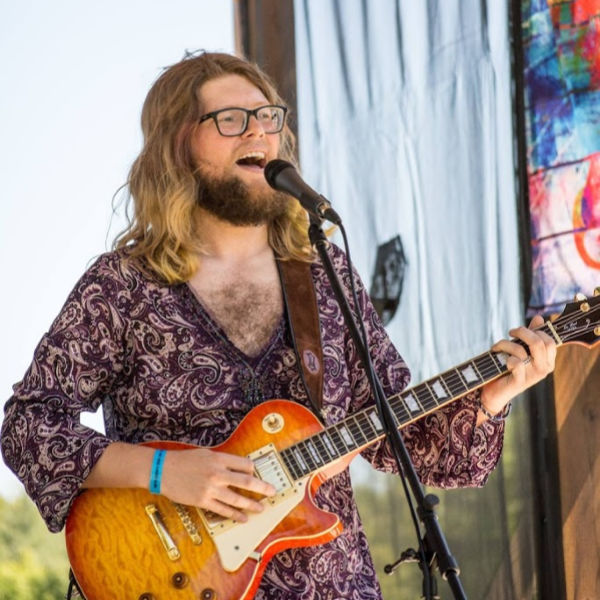Christopher Stott-Rigsbee. Photo: Jerry Cadieux
Christopher Stott-Rigsbee, multi-instrumentalist, visual artist, and songwriter, is the founder and front person of the freak folk musical group Adrian Aardvark and the co-founder and co-editor of (as well as frequent contributor to) the comic book series Trashburgh Comix.

Photo: Christopher Stott-Rigsbee
A prolific musician with over 12 albums to his name, Stott-Rigsbee was on the cusp of finishing his newest Adrian Aardvark project, a 14-song album he’d been recording with collaborator Chris Shar in Burlington, Vermont until the COVID-19 pandemic paused production. In the meantime, Stott-Rigsbee has been writing and making art out of his home in Plattsburgh, New York while working to nurture himself and others through the power of kindness and art.
We sat down (virtually) to talk to Stott-Rigsbee about his past, present, and future.
NEW YORK MAKERS: What’s it been like to work with Chris Shar (formerly of Man Man and Santigold)?
CHRISTOPHER STOTT-RIGSBEE: I met Chris in a coffee shop about three years ago. He’s such a chill dude and has taught me a lot about recording and song structure. He pushes me to be a better songwriter. Before this all started, I would often go to Burlington to record -- working on mixes and getting better tones. We’ve been working out of Chris’ home studio that he’s been building for years. He has a lot of instruments he’s been letting me use, and it’s made a big difference to have that strong connection going into our collaboration. I always want to experiment and try new things. I keep my chord structures relatively simple in my songs and usually my vocal melodies are the more diverse and creative element. I like to be able to put down a foundation that’s strong enough for other people to come in and take more risks with what they’re adding.
NYM: How did the new album come to be?
CSR: It was really difficult to come back from what I perceived to be a business failure with my album, Dying Optimistically. I came out of it more in debt because of some of the risks I took and wasn’t able to pay my band members what they’re worth. I’m grateful to them for sticking around and continuing to do this with me even when we’re not getting that financial validation.
The album was received well by the people that saw us live, but we weren’t able to build the infrastructure that I was hoping for to really push it to the next level. I think that really crushed me. I really didn’t want to play another show in someone’s basement and not get paid. I just felt disappointed in myself. It gave me writer’s block for a while. But talking with other artists about those ebbs and flows of creativity ultimately helped motivate me to keep moving forward.
That led me to writing my most recent album, Holy Abandonment. That one was totally DIY and there was something really freeing about not needing anyone else to do it. I really used that album as a way to explore my own feelings about growing up with a religious background and in a military family with a government presence always looming. There was that inherent pressure to look good and square -- to really fit a mold or else be a sinning hedonist and damned to hell.

Left to right: Chris Lee Shacklett, Shannon Stott-Rigsbee, Christopher Stott-Rigsbee, and Catherine Harrison-Wurster. Adrian Aardvark. Photo: Jerry Cadieux
NYM: How has your upbringing influenced you?
CSR: Initially, I rebelled against it pretty hard. As a teenager, I became an atheist and kind of an anarchist. And then, over time, I came to the place I am now, where I realize that I have spirituality in myself. All of that discovery was really through making Holy Abandonment and writing those songs. It was nice to have that epiphany of self-love, to realize that it’s ok that I don’t really believe in our government or in organized religion. I’m still a positive creature.
NYM: What does songwriting mean to you?
CSR: It’s meant a lot to me to have this artistic platform and outlet where I can express myself so fully where I don’t have that confidence in my day-to-day. I think Daniel Johnston said something to that effect -- that it’s somehow easier to say all of your feelings in a song than it is to say them out loud to someone. It feels like when big feelings are put into a song that maybe they’re more digestible for other people. I always hope that the art I’m putting out there will reach someone and maybe unlock something in their mind.
NYM: What is your philosophy these days?
CSR: I’m trying to be ok with working towards the unknown and the uncertain future that there will be. Especially in these "unprecedented times," I’m reminding myself that I have no true power in anything that is going to come. Life could be much shorter than I think it’s going to be. I have made changes so that I will live a longer and healthier life, but I could get into a car accident tomorrow and not be here. I try to overcome that with love and live in the now.
It’s a little strange going from being a noisy, punk kid to being a metaphysical, peaceful "in the now" dude. I still have so much anger and other things that I’ve been working out with my past but I think I’ve come to a place where I don’t care so much anymore. I just want peace. I’ve had enough of the not-calm. I just want calm and love.
NYM: How does live performance fit into that?
CSR: There is such an exchange of love in a live performance. You can feel it when you’re really connecting with the audience. You can feel it when you’re singing and people are really listening. You’re all in the moment together. Sometimes it’s really sad and they’re crying and I’m crying but somehow we make it through the song together. Through those emotions together. It gives us all a sense of hope.
I love talking with people after shows. I love talking about deeper things and connecting with people. If someone needs a hug after a show, I’m there. It’s what life should be -- caring, community, empathy, love.
NYM: Did you move around a lot as a kid?
CSR: Oh, ya. We lived in South Carolina, Florida, Virginia, Rhode Island, New York, Maine, Texas, Guam, and Keflavík, Iceland.
NYM: How did you end up in New York?
CSR: My dad was born and raised in West Chazy, New York. As a military kid, it was the only place I felt kind of a constant connection to, growing up. We always visited my grandparents there. I moved here in 2004 and then did this thing where I kept moving away and coming back for a few years until, finally, in 2010 I committed to living here. It’s the longest I’ve ever lived anywhere, by far.
NYM: How are you doing in quarantine?
CSR: I have better days and worse days. When I’m not working, I try to be gentle with myself. I figure out what I have to do that day and then try to knock out the chores first so that I can do something nice like sit out in the sun and read. If it’s raining, I’ll maybe put on an album I haven’t heard in a while and get lost in it. Sometimes I just draw to draw. It takes me out of my anger and feelings of being overwhelmed and helpless. I’ve been making comics. It’s nice to let my mind go and just draw. I like to play with that part of creativity and imagination.
NYM: When are you hoping to release your new album?
CSR: It’s so close to being done. I’d like to put it out in October of 2020 but maybe it’ll be in October of 2021. It’s a nice fall album. In the meantime, I’m in a really weird band called "Our Holy Orgasmic Cosmic Rays". It’s mostly songs I wrote in High School. I play the song for the band one time and then we just improvise on it and record. Or we just and do weird free poetry. It’s really fun. Not to be taken too seriously. But I’m working on a new album with them as well, and that’s almost done.
NYM: How does visual art come into play?
CSR: I’ve illustrated most of my album covers. Jon Vermilyea did the art for Dying Optimistically. I used to make little mini comics and sell those on tour. Sometimes I would do a lyric booklet in comic form. I stopped doing that for a while to focus on songwriting. In the last two years I’ve really gotten back into drawing and making comics. I’m realizing lately that the visual art I make really represents what I’m trying to do with music but in a visual way. That’s been really cool to realize. I have confidence in my songwriting, and I feel like I’m having to borrow that confidence a little to spread it onto my visual artwork and other areas.
NYM: Is there anything you’d like to leave us with?
CSR: I hope that this time we’re in will reinvigorate the arts. I hope that people will come together even stronger after all of this is done. Community is the bloodline of the arts. We need that to live and to motivate our own creativity.

Leave a comment